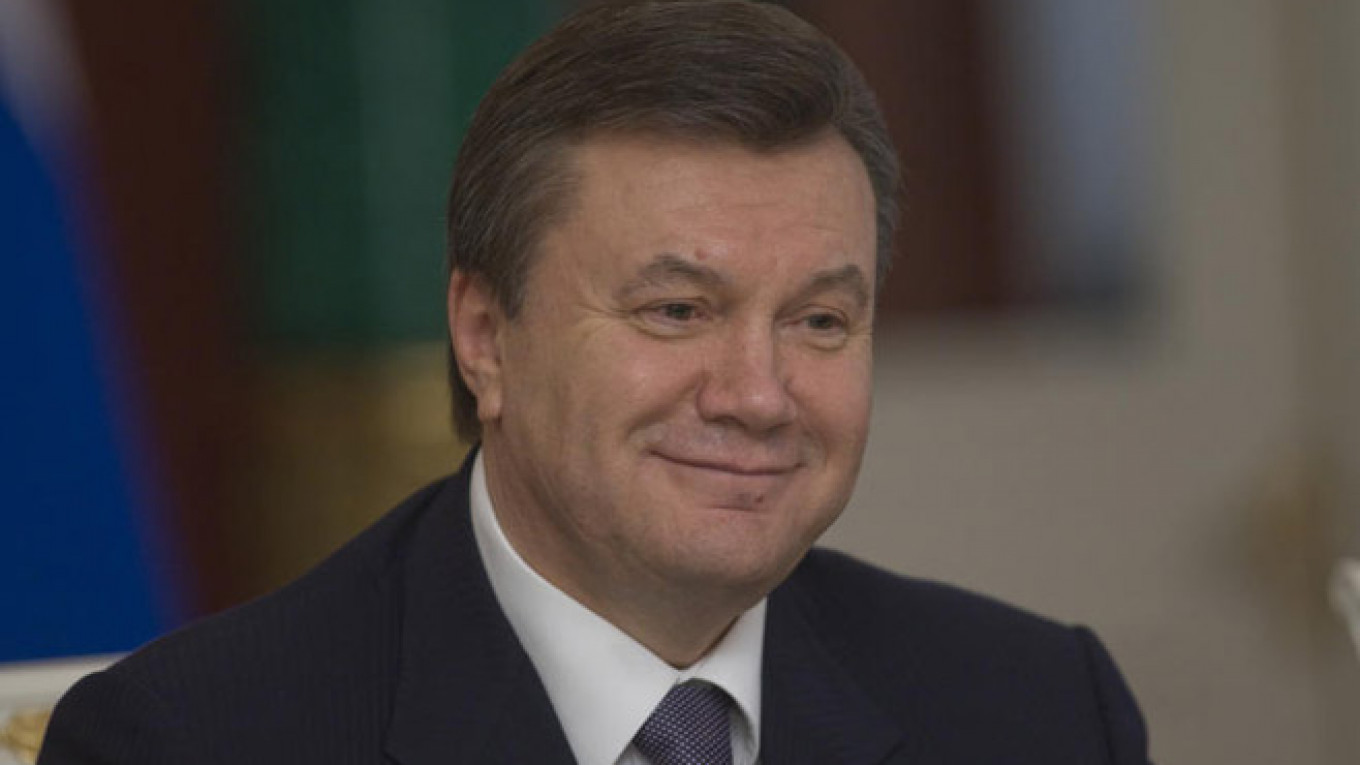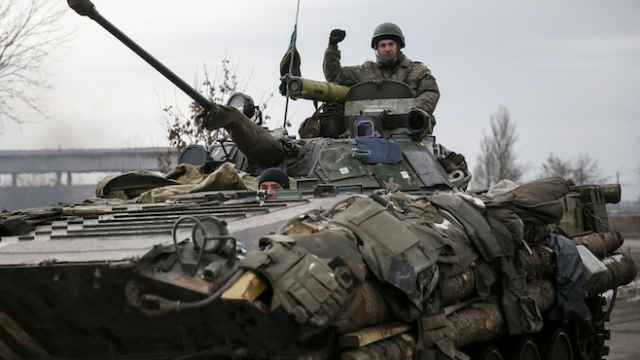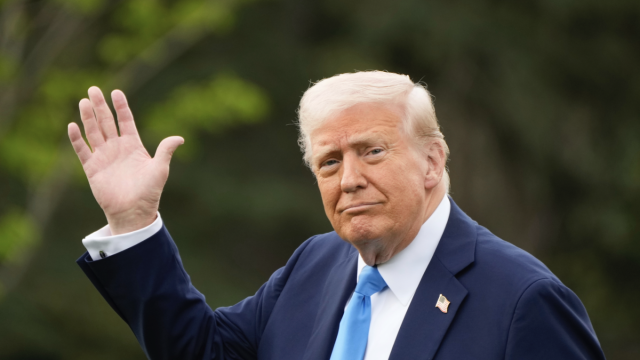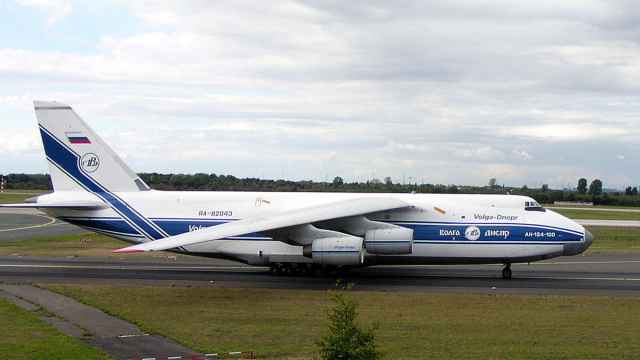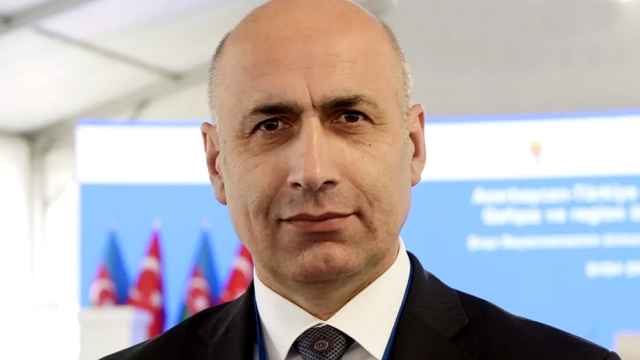One year ago, when Ukraine's beleaguered fourth President Viktor Yanukovych fled Kiev, he had limited options in terms of where he could seek refuge.
His exit from the capital on Feb. 21 was preceded by three dark days in which 77 protesters and 18 police officers died in street clashes in circumstances that are still not entirely clear, many of them shot by snipers. The deaths were the tragic climax of mass-scale street protests sparked three months earlier over Yanukovych's decision to postpone the signing of an Association Agreement with the European Union.
While Yanukovych argued that he had fled out of fear for his personal safety, his power base in Kiev had effectively collapsed, with most major government buildings occupied by protesters.
On Feb. 21 he flew by helicopter to Ukraine's second-largest city of Kharkiv in a last-ditch attempt to retain at least some scraps of his waning power over the country, according to news reports and the recent book "Maidan: The Untold Story," published in Ukraine this week to coincide with the first anniversary of the climax of the popular uprising in central Kiev that swept away the government.
After realizing that he had lost the support of even his closest allies, he reportedly then flew to the city of Donetsk, now the capital of the self-proclaimed separatist Donetsk People's Republic. From there, he attempted to fly to Russia, but his plane was not given permission to take off. He then drove to Crimea, which would be annexed by Russia less than a month later.
From Crimea, Yanukovych was escorted to Russian territory by military boat and on Feb. 25, together with Ukraine's former Prosecutor General Viktor Pshonka and former Interior Minister Vitaly Zakharchenko, he was already ensconced on the 11th floor of Moscow's luxurious Hotel Ukraina, according to the book.
All three men, together with another trio of disgraced former officials, are now included on the EU sanctions list because they are wanted in Ukraine in connection with the embezzlement of state funds and their illegal transfer outside Ukraine. They are also all reportedly now living in Moscow.
Top-Level Extraction
"I'll say openly that he [Yanukovych] asked us to get him to Russia, and we did that," President Vladimir Putin told Russia-watchers at a Valdai discussion club meeting in October.
In Moscow, Yanukovych moved to Barvikha, one of the most expensive neighborhoods in Moscow's suburbs, the RBC news website reported. Novo-Ogaryovo, one of Putin's official residences, is nearby.
In an interview with Ukraine's LB.ua news website last July, Yanukovych's son Alexander said that his father was now "meeting with people and analyzing the situation all the time."
One of those meetings was with U.S. film director Oliver Stone, who interviewed Yanukovych in December for his upcoming documentary about the mass protests in Kiev.
"I am confident that my father, with his experience and knowledge, will be useful to our country, no matter how unrealistic it sounds today," Alexander Yanukovych said in the interview.
Like Father, Like Son
Alexander Yanukovych himself fled Ukraine via a similar path to his father's, but stayed in Crimea for more than a month until the peninsula became Russian territory, only then moving to Moscow.
Without letting the grass grow under his feet, in May, Alexander Yanukovych — who under his father's presidency had become one of the most influential businessmen in Ukraine — opened two enterprises: Arsenal-Invest and Arsenal-Estate in St. Petersburg. According to Arsenal-Invest's registration documents, obtained from an open-source database, the company's primary function is "managing industrial groups and holdings."
Mykola Azarov, Prime Minister under Yanukovych in 2010-2014, also fled to Moscow via Kharkiv. Earlier this month, Azarov convened a news conference in Moscow at which he presented his book on the political crisis in Ukraine. He did not specify how he spends his time in Russia apart from writing. The RBC news website reported last October that Azarov might be the owner of a land plot occupying 4,000 square meters in the prestigious Istra district of the Moscow region.
Former Interior Minister Alexander Zakharchenko, who is suspected by the current Ukrainian authorities of organizing the mass killing of protesters on Maidan, has received Russian citizenship and became a senior consultant at Russia's Rostec state corporation, established to develop hi-tech industrial production in the country, the TASS news agency reported last month.
Former Deputy Prime Minister Sergei Arbuzov also lives in Moscow, according to RBC, but works in St. Petersburg, where he presides over the Center for Research into Economic, Social and Cultural Development of the Countries of the CIS, Central and Eastern Europe. According to the center's website, the center is located in the Russian Academy of Sciences' building in St. Petersburg.
Former Prosecutor General Pshonka, infamous for his ostentatious house on the outskirts of Kiev, has mostly flown under the public radar since the toppling of the regime. But in the case he brought against the European Union in its General Court over the sanctions imposed against him, he says that he currently resides in Moscow.
The current Ukrainian government that came to power following the flight of these men has issued arrest warrants against all of them, and Interpol followed suit: Yanukovych and Azarov are wanted by the international police agency on suspicion of misappropriation and embezzlement. Russia has extradition agreements with Ukraine and other CIS countries, but last week, Russia's Prosecutor General Yury Chaika said that Russia would not grant extradition requests for the former president, saying he was being prosecuted in Ukraine for political reasons.
Under international law, Chaika said, Russia is entitled to reject extradition requests for individuals being prosecuted for political reasons. Moscow, accordingly, looks set to remain a safe haven for Ukraine's fugitive former officials.
Contact the author at i.nechepurenko@imedia.ru
A Message from The Moscow Times:
Dear readers,
We are facing unprecedented challenges. Russia's Prosecutor General's Office has designated The Moscow Times as an "undesirable" organization, criminalizing our work and putting our staff at risk of prosecution. This follows our earlier unjust labeling as a "foreign agent."
These actions are direct attempts to silence independent journalism in Russia. The authorities claim our work "discredits the decisions of the Russian leadership." We see things differently: we strive to provide accurate, unbiased reporting on Russia.
We, the journalists of The Moscow Times, refuse to be silenced. But to continue our work, we need your help.
Your support, no matter how small, makes a world of difference. If you can, please support us monthly starting from just $2. It's quick to set up, and every contribution makes a significant impact.
By supporting The Moscow Times, you're defending open, independent journalism in the face of repression. Thank you for standing with us.
Remind me later.


